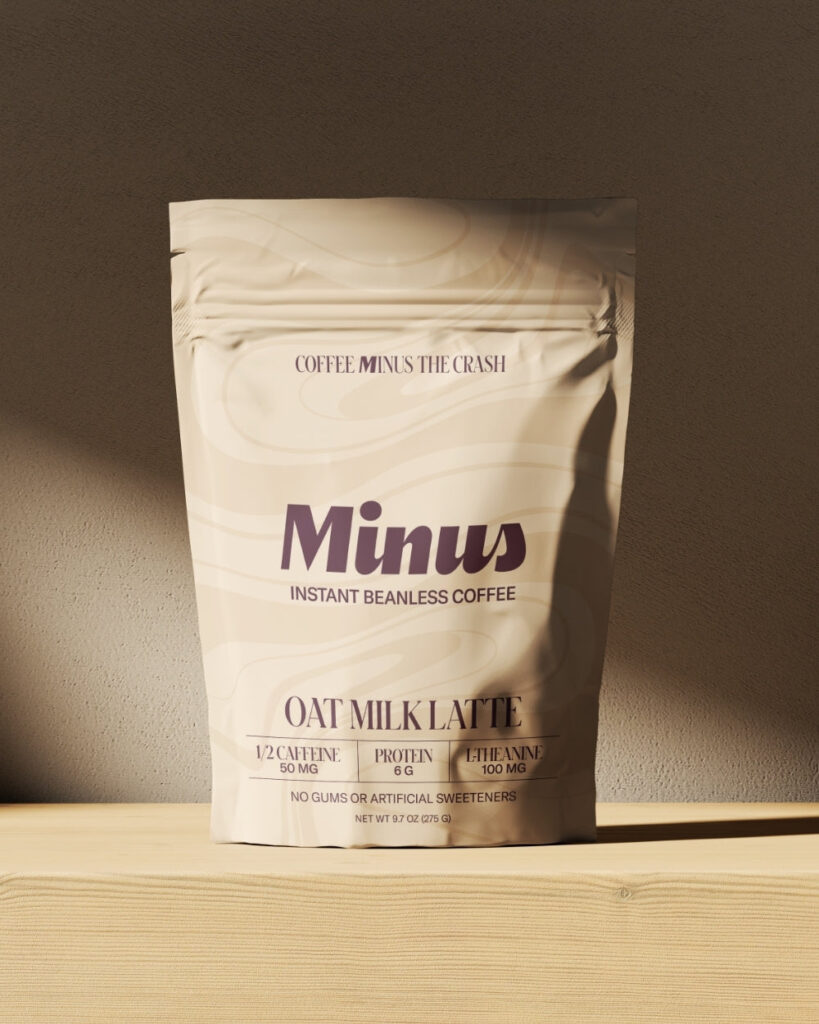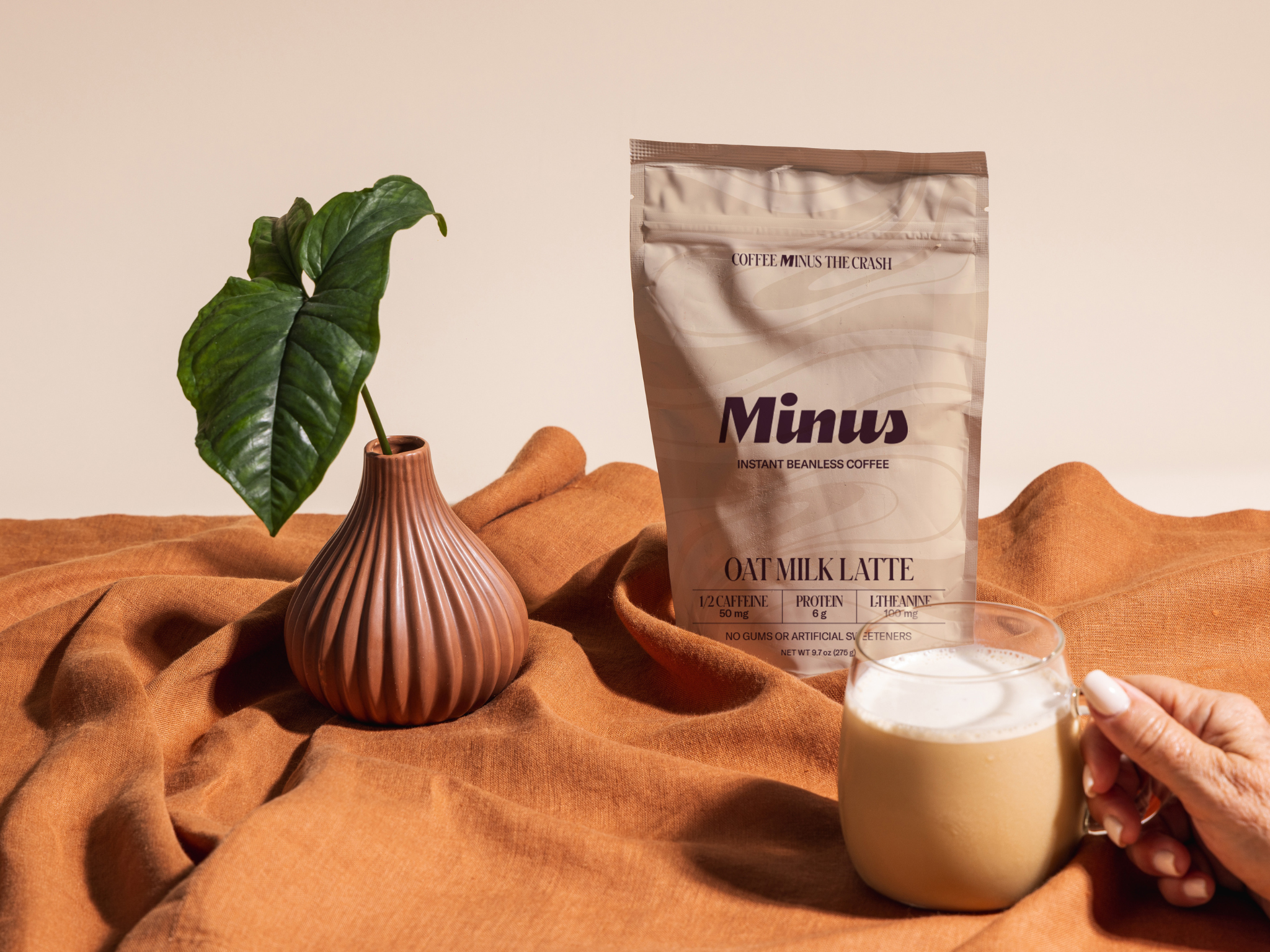6 Mins Read
Californian food tech startup Minus Coffee has debuted a new beanless instant oat milk latte with calibrated caffeine, L-theanine and pea protein to support women’s health.
As the demand for functional drinks expands, women-led startup Minus Coffee – which makes coffee without the bean – has entered the space with a dairy-free instant latte powder that prevents caffeine crashes, provides complete protein, and enhances sleep.
The San Francisco-based firm’s Instant Oat Milk Vanilla Latte is geared towards women’s wellness and cortisol balance, featuring half as much caffeine as the average cup of coffee, a dose of L-theanine to improve focus while avoiding jitters and brain fog, and 6g of pea protein.
And by eschewing coffee beans for a variety of upcycled and lower-carbon ingredients – think date seeds, chicory and lentils – it’s much better for the planet, as well as a coffee industry facing high demands and strained supplies.
It marks the brand’s second beanless coffee line, following its canned cold brew and vanilla oat milk latte. “Instant coffee allows us to innovate and offer consumers an energising product that doesn’t compromise their wellbeing,” Maricel Saenz, founder and CEO of Compound Foods – Minus’s parent company – tells Green Queen.
“Minus has always reflected my personal journey. After struggling with anxiety and burnout, I realised my love for coffee needed balance – less caffeine and more support for my mind and body,” she adds. “Powdered formats are also convenient, customisable, and sustainable, aligning with our vision to create products that are better for people and the planet.”
How Minus makes its functional beanless coffee

Saenz explains that Minus’s process is similar to traditional instant coffee, starting by roasting date seeds, chicory, sunflower seeds, carob, lentils, grape seeds, and millet malt. These are then put through a fermentation process to bring out coffee-like notes of berries and dark chocolate, giving the product a flavour advantage over mushroom-based beverages.
Over 40% of the ingredients are upcycled, and the caffeine content is extracted from tea leaves. “We then brew and freeze-dry the coffee. For select SKUs, we enhance flavour and functionality by incorporating our proprietary fermented inputs,” notes Saenz.
“We source an oat milk creamer from a trusted partner and further customise it to perfectly complement our unique latte formulation,” she adds. The addition of oat milk – which comprises avocado and MCT oils – allows Minus to lend the product a creamy and naturally sweet profile, while catering to the allergic to soy, nuts and dairy. It’s also rich in fibre, and requires minimal water and energy to produce.
The beanless instant coffee contains 50mg of caffeine per 8oz serving, supplying antioxidants and a gentle energy boost. There’s also 100mg of L-theanine, which helps slow caffeine absorption, sustain energy, balance cortisol spikes, reduce stress, and improve sleep. Meanwhile, its protein content rivals that of an egg and provides all nine essential amino acids.
“From the inception of this product, we relied on scientific literature to evaluate which ingredients to include. Among the adaptogen-like ingredients we tested, L-theanine and protein have the strongest scientific backing for their effects on the body, particularly when combined with caffeine. We pride ourselves on using evidence-based decisions for product design and messaging,” says Saenz.
A product designed for women

As consumers deepen their focus on sleep amid rising stress and anxiety levels, they’re increasingly turning to functional beverages. The US is already the world’s largest market for functional energy and sports drinks, representing around one in every three dollars spent.
This formed the basis of over 250 functional beverage launches in 2023, contributing to a market that is already valued at $230B globally. One in eight people have consumed beverages with nootropics like L-theanine, with intake levels higher in Gen Zers (20%) and millennials (17%).
But a third of women say they don’t consume functional drinks at all, compared to 27% of men. This also mirrors coffee consumption trends in the US. However, with the functional coffee market set to approach $8B by the end of the decade, there are plenty of opportunities for brands like Minus to make a mark.
“People are seeking functional foods and drinks to help them feel their best and support their specific health and wellness goals,” says Saenz. “Consumers are becoming more aware of how what they consume impacts how they feel. There’s a growing recognition of caffeine’s effects on the body and a deeper understanding that not all bodies react to it the same way.”
She outlines Minus’s goal to support women’s health, which is “often overlooked”, through balance and sustained energy. “We designed this product with their unique needs in mind – whether it’s reducing caffeine jitters, increasing protein intake, or supporting energy transitions during perimenopause,” she says.
“We believe this product resonates with women in their 30s seeking a more balanced, grounded lifestyle, and with women experiencing perimenopause, where less caffeine and more protein can support the body’s natural transitions.”
Why we – and farmers – need beanless coffee

Coffee is one of the most carbon-emissive food items, with its GHG impact only surpassed by red meat and dark chocolate. And producing a single cup of joe requires up to 140 litres of water. Minus is among a number of beanless coffee startups hoping to safeguard the future of the industry and the planet – its version uses 92% less land and 94% less water, while producing 86% fewer carbon emissions.
At the same time, climate change is wrecking the world of coffee. Extreme weather events, combined with increasing demand, are leading to crop failures and shortages, pushing up arabica prices by 80% last year, with wholesale prices reaching a nearly 50-year high.
The area suitable for growing arabica – roughly forming a ‘belt’ between the tropics – is shrinking, and could be cut in half by 2050. This puts it among the 60% of endangered coffee species, with experts suggesting arabica could become extinct in the next 60 years.
More and more startups are coming up with alternative solutions. Like Minus, several others – including Voyage Foods, Atomo, Prefer, and Northern Wonder – are making beanless coffee. But Pluri and Stem are working on cell-based versions, and Amaterra is leveraging molecular biology and crop genetics to develop perennial coffee varieties.
Industry giants like Starbucks and Nestlé, meanwhile, have developed climate-resilient arabica varieties to protect farmers and the coffee economy. This is a major criticism of beanless coffee – 80% of all coffee is grown by smallholder farmers, and 125 million people are dependent on the industry for their livelihoods.
But startups in this space argue that they’re presenting an alternative to complement the existing supply chain, not displace it. “Our goal isn’t to replace coffee, but to offer an alternative way to make it – one that addresses supply chain challenges exacerbated by climate change,” says Saenz.
Asked about comparisons between conventional and beanless versions, she states: “We hold our products to the highest quality standards, conducting blind taste tests and comparing ourselves to premium coffee.”



